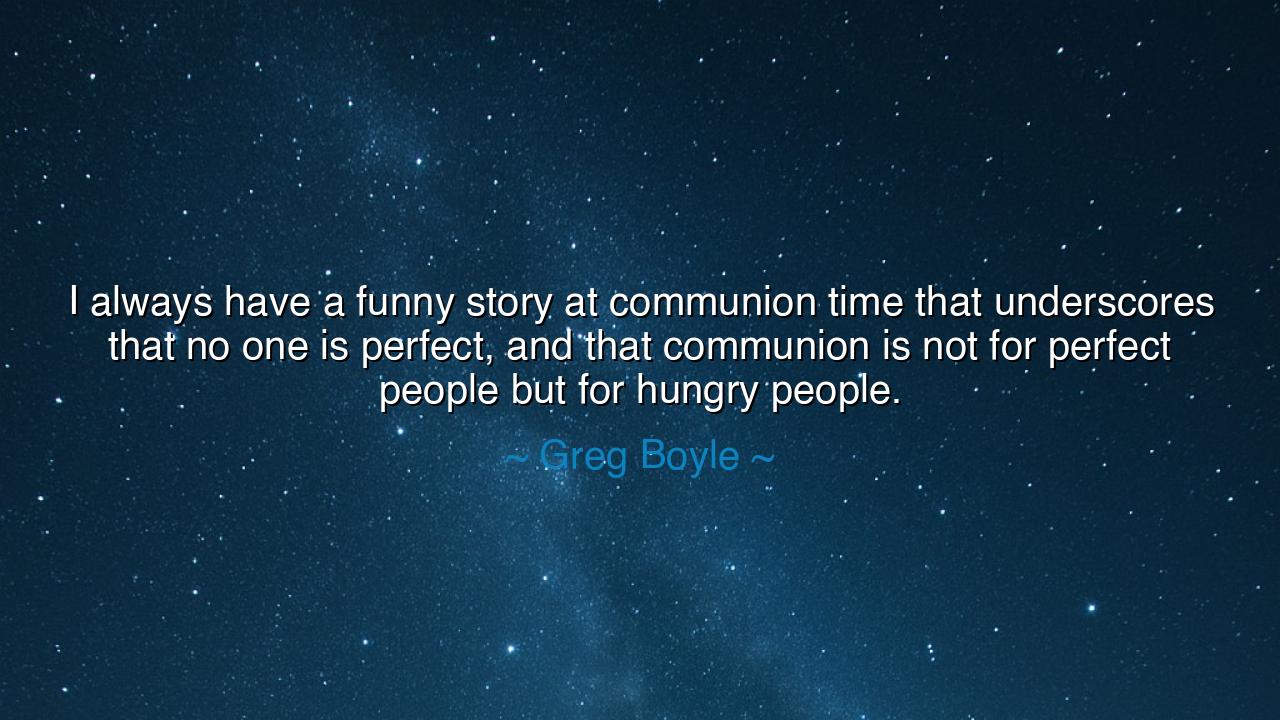
I always have a funny story at communion time that underscores
I always have a funny story at communion time that underscores that no one is perfect, and that communion is not for perfect people but for hungry people.






The modern priest and peacemaker Greg Boyle, who has walked among the broken and the forgotten, once said: “I always have a funny story at communion time that underscores that no one is perfect, and that communion is not for perfect people but for hungry people.” His words shine with the soft light of compassion, revealing a truth as ancient as faith itself — that grace is not a prize for the flawless, but food for the starving soul. In this teaching lies both laughter and holiness, the laughter of humility and the holiness of love that welcomes all who come in need.
Boyle’s wisdom arises from his life among those whom society has cast aside — the gang members, the addicted, the wounded. He learned, not from books, but from the streets, that humanity is not divided into saints and sinners, but bound together by shared hunger. When he speaks of communion, he does not speak merely of the sacred ritual, but of the deeper communion that all people long for — the communion of being seen, accepted, and loved despite their imperfection. His “funny story” at the altar is no triviality; it is an act of mercy disguised as humor, reminding the weary that even holiness can smile.
The ancients understood this too. In the time of the early Church, the table of communion was called “the table of the poor.” It was not a throne for the righteous, but a hearth for those who were lost. The Apostle Paul once wrote that we should come to the table “in remembrance” — not as the worthy, but as the forgiven. Boyle’s words echo that sacred lineage. He reminds us that faith is not an achievement but a hunger, not a badge of perfection but a cry of need. Those who believe they deserve communion misunderstand it entirely; those who come trembling, hungry, laughing at their own folly — they are the ones who truly receive.
Consider the story of Francis of Assisi, the wealthy merchant’s son who renounced all riches to live among the poor. He called himself “God’s fool,” laughing as he begged for bread, seeing in his poverty not shame but closeness to the divine. When the proud mocked him, he only smiled, saying, “If God can work through me, He can work through anyone.” Francis, like Boyle, knew the power of imperfection. His laughter was his prayer, his hunger his holiness. Both men teach that the table of love is wide enough for every soul, and that laughter itself can be a bridge between heaven and earth.
Boyle’s mention of a funny story holds a special kind of sacred irony. In laughter, he levels the ground between priest and sinner, saint and skeptic. He breaks the illusion that faith must be solemn and that God dwells only in the serious. His humor becomes an act of divine hospitality — it invites the brokenhearted to the table without fear. For if the priest himself can laugh at his own flaws, then perhaps the sinner can, too. In that laughter, shame loses its hold, and hunger becomes holy. The funny story becomes the doorway to grace.
This quote, then, is not merely about religion; it is about the human condition. We are all hungry people — hungry for belonging, for forgiveness, for meaning. In every heart, there is an altar waiting to be set, and a place at the table waiting to be filled. Communion, in Boyle’s sense, is life itself — the coming together of souls who admit, with humility and humor, that they are unfinished, imperfect, and yet deeply loved. To recognize our hunger is not weakness; it is the beginning of wisdom.
The lesson, therefore, is this: do not wait until you are perfect to come to the table — come now, as you are. Bring your laughter, your wounds, your hunger. The divine does not ask for perfection; it asks for presence. Be gentle with yourself and with others, for everyone you meet is starving for love in their own way. Feed them not with judgment, but with kindness. And when you stumble — as all must — do not despair, but laugh as Greg Boyle laughs, knowing that grace was made for the imperfect and that love, like bread, was meant to be shared.
So, my child, remember this sacred truth: communion is for the hungry. Life’s table is not reserved for the pure, but for the honest. Come to it often, with an open heart and a humble smile. Tell your own funny story at the altar of the everyday, reminding the world that laughter and mercy can dwell together. For it is in that laughter — humble, human, hungry — that heaven bends low, and touches the earth.






AAdministratorAdministrator
Welcome, honored guests. Please leave a comment, we will respond soon